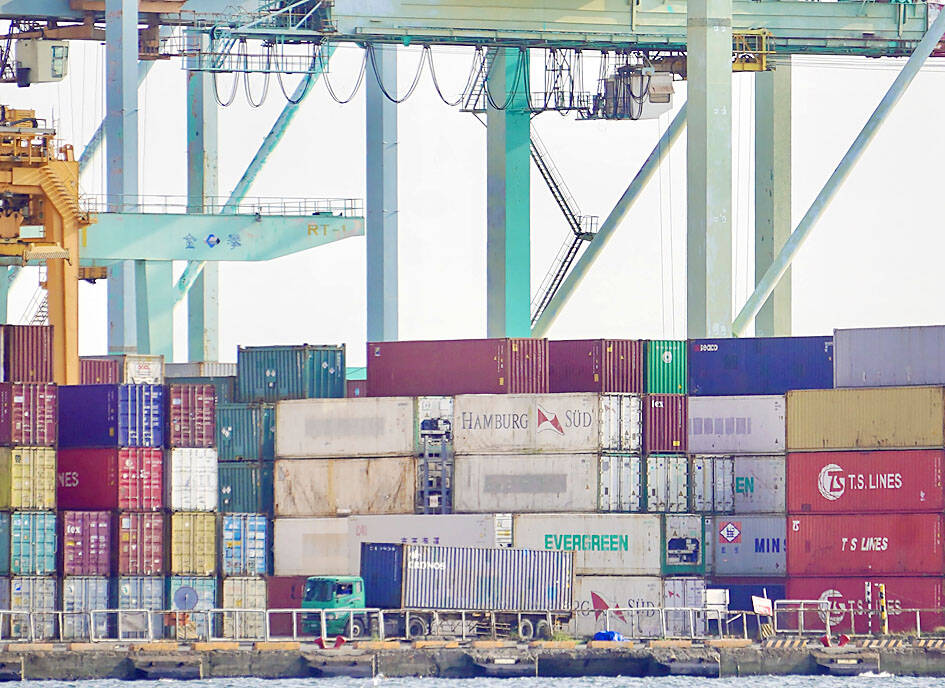Export orders fell 3.1 percent last month, the steepest annual decline in five months, to US$60.93 billion, as inflation and interest rate hikes lowered demand for some types of electronics and a bulk of traditional goods, Ministry of Economic Affairs data showed yesterday.
But the decline was offset to a certain extent by the launch of new iPhones by Apple Inc and increasing demand for emerging technologies and applications, the ministry said.
Export orders from China last month contracted by 27.9 percent annually to US$11.55 billion, declining for the sixth quarter in a row, as Beijing’s “zero COVID” policy hurt the world’s second-largest economy and curtailed Chinese consumer spending, while orders from the US, Europe and ASEAN nations rose by 2.8 percent, 9.6 percent and 12.5 percent, respectively, the ministry said.

Photo: CNA
Export orders last quarter contracted 1.1 percent year-on-year to US$169.78 billion from US$171.71 billion, ending nine consecutive quarters of expansions. That represented quarterly growth of 2.2 percent from US$166.17 billion.
In the first three quarters of this year, export orders increased 5.7 percent from a year earlier to US$509.07 billion, the ministry said.
The fourth quarter is expected to have a weak start, as export orders are forecast to drop at an annual rate of between 1 percent and 3.6 percent, or US$57 billion and US$58.5 billion, the ministry said.
The US’ latest semiconductor export controls on China should have a limited effect on local companies based on its preliminary assessment, it said.
“The ministry’s projection reflects the impact from a worsening global economy as central banks around the world are raising interest rates further to rein in rising inflation,” Department of Statistics Director Huang Yu-ling (黃于玲) said yesterday.
Uncertainties about the war in Ukraine and the COVID-19 pandemic are also adding downside risks to the world economy and trade, Huang said, adding that order visibility is short.
Orders for electronics — primarily semiconductors — rose 6 percent annually and 8.5 percent monthly to US$20.66 billion, driven by chips used in 5G-related applications, high-performance computing devices and automotive electronics, ministry data showed.
Orders for information and communications technology products grew 5 percent year-on-year and 42.7 percent month-on-month to US$20.36 billion, fueled by demand for Apple Inc’s new iPhone 14 series, cloud-based data centers and networking devices.
Orders for optoelectronics, including flat panel displays, fell 41.1 percent year-on-year and 3.6 percent month-on-month to US$1.69 billion, attributable to sluggish demand for TVs and notebook computers.
An inventory correction cycle also reduced orders, the ministry said.
Orders for base metals dipped 31 percent year-on-year and 6.1 percent monthly to US$2.23 billion last month, amid soft demand for steel products worldwide, the data showed.
Orders for machine tools contracted 9.8 percent annually, but increased 1.1 percent monthly to US$1.93 billion, as manufacturers invested conservatively in new machines and manufacturing equipment, it showed.
Orders for plastics declined 32.3 percent annually and 8.4 percent monthly to US$1.77 billion, while petrochemical product orders fell 20.2 percent annually and 5 percent monthly to US$1.67 billion due to inventory issues and dwindling demand, the data showed.

TRADE WAR: Tariffs should also apply to any goods that pass through the new Beijing-funded port in Chancay, Peru, an adviser to US president-elect Donald Trump said A veteran adviser to US president-elect Donald Trump is proposing that the 60 percent tariffs that Trump vowed to impose on Chinese goods also apply to goods from any country that pass through a new port that Beijing has built in Peru. The duties should apply to goods from China or countries in South America that pass through the new deep-water port Chancay, a town 60km north of Lima, said Mauricio Claver-Carone, an adviser to the Trump transition team who served as senior director for the western hemisphere on the White House National Security Council in his first administration. “Any product going

High above the sparkling surface of the Athens coastline, the cranes for building the 50-floor luxury tower centerpiece of Greece’s future “smart city” look out over the Saronic Gulf. At their feet, construction machinery stirs up dust. Its backers say the 8 billion euro (US$8.43 billion) project financed by private funds is a symbol of Greece’s renaissance after the years of financial stagnation that saw investors flee the country. However, critics see it more as a future “ghetto for the rich.” It is hard to imagine that 10km from the Acropolis, a new city “three times the size of Monaco”

STRUGGLING BUSINESS: South Korea’s biggest company and semiconductor manufacturer’s buyback fuels concerns that it could be missing out on the AI boom Samsung Electronics Co plans to buy back about 10 trillion won (US$7.2 billion) of its own stock over the next year, putting in motion one of the larger shareholder return programs in its history. South Korea’s biggest company would repurchase the stock in stages over the coming 12 months, it said in a regulatory filing on Friday. As a first step, it would buy back about 3 trillion won of paper starting today up until February next year, all of which it would cancel. The board would deliberate on how best to effect the remaining 7 trillion won of buybacks. The move

In a red box factory that stands out among the drab hills of the West Bank, Chat Cola’s employees race to quench Palestinians’ thirst for local products since the Gaza war erupted last year. With packaging reminiscent of Coca-Cola’s iconic red and white aluminum cans, Chat Cola has tapped into Palestinians’ desire to shun brands perceived as too supportive of Israel. “The demand for [Chat Cola] increased since the war began because of the boycott,” owner Fahed Arar said at the factory in the occupied West Bank town of Salfit. Julien, a restaurateur in the city of Ramallah further south,